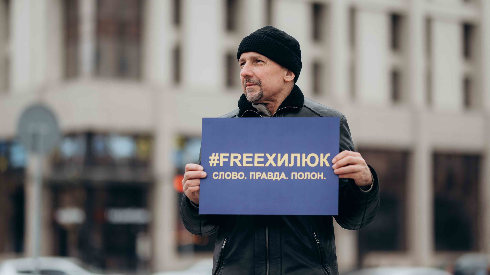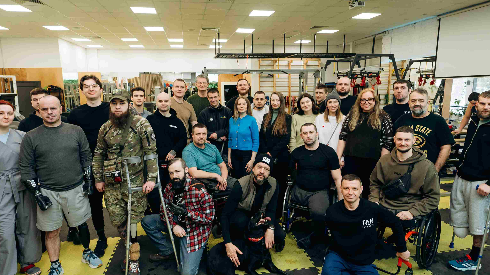
1+1 media group signs statement on threats to media reform and Ukraine's European integration path
To the President of Ukraine
To the President of Ukraine
Chairman of the Verkhovna Rada of Ukraine
Ruslan Stefanchuk
Chairman of the Verkhovna Rada Committee on Humanitarian
and Information Policy
Mykyta Poturayev
Prime Minister of Ukraine
Denys Shmyhal
Vice Prime Minister for European and
and Euro-Atlantic Integration of Ukraine
Olga Stefanishyna
Ambassador of the European Union to Ukraine
Matti Maasikas
For ten years, Ukraine has been at war with the Russian Federation, which has failed to accept the right of a sovereign state to determine its foreign policy course, democratic system and intentions to return to the European family of nations.
Ukraine pays an exorbitant price every day for the right to be an independent, self-sufficient state with the rule of law and freedom of speech - phenomena that frighten the authoritarian regimes of its north-eastern neighbours. It is thanks to this aspiration that Ukraine was able to sign the Association Agreement and, during the full-scale invasion, to obtain the status of an EU candidate country. However, in order to confirm this status, Ukraine had to fulfil one of the 7 requirements of the European Commission, namely to "overcome the influence of vested interests by adopting a media law that harmonises Ukrainian legislation with the EU Audiovisual Media Services Directive and empowers an independent media regulator".
In pursuance of this paragraph, on 13 December 2022, the Verkhovna Rada of Ukraine adopted the Law of Ukraine "On Media", which entered into force on 31 March 2023. The Law implements the approaches of the EU Audiovisual Directive and contains a number of mechanisms to increase transparency of financial reporting and media ownership structure, introduces a single media regulator for all media and brings about a change in the culture of media market regulation. The Media Law has already been highly praised by the Council of Europe's official expert review, and at the EU-Ukraine summit in February 2023, progress in meeting media requirements was highlighted as one of the most significant.
However, the mere fact that legislation has been adopted does not guarantee its quality implementation: it directly depends on the resources allocated to it, the availability of professional staff and timely decisions. It should be noted that before the law came into force, some of its provisions were already suspended until 2023, the year when most actions to implement it are to be taken, including the development and adoption of bylaws, the creation of an electronic cabinet, etc.
For example, the Law "On Amendments to the Law of Ukraine "On the State Budget of Ukraine for 2023", among other things, suspended the provisions of Articles 78, 84, 89 of the Law of Ukraine "On Media" until 2023. All these provisions of the Law guarantee financial support for the activities of the media regulator:
1) remuneration of the members of the National Council of Ukraine on Television and Radio Broadcasting;
2) remuneration of the staff of the National Council;
3) the level of general funding of the regulator guaranteed by the Law;
4) an important additional source of financial support for the regulator - at least 4% of the fee for the use of the radio frequency spectrum of Ukraine in the current year.
The suspension of the provisions not only jeopardises the quality of the law's launch, but also created a legal conflict when the mechanism for calculating the remuneration of the National Council members disappeared.
In addition, the amendments made by the Cabinet of Ministers of Ukraine to Resolution No. 304 of 20.04.2016, which sets the salaries and general conditions of remuneration of the members of the media regulator at UAH 21,000 for a member and UAH 25,000 for the Head of the National Council, do not meet either the level of responsibility or the principles of independence of the regulator. After all, all norms relating to the financial independence of the regulator have been suspended, and all funding, including the salaries of the National Council members and staff, is regulated manually by the executive branch of government.
This situation directly contradicts the requirement of Article 30 of the Directive, which sets out the obligation of States to ensure the legal separation of regulators from government and functional independence from their governments; to ensure that national regulatory institutions and bodies have adequate financial and human resources, as well as enforcement powers, to enable them to perform their functions effectively and to facilitate the work of ERGA.
Aware of the fact that defence spending is the number one priority, on which all other state budget expenditures are determined, we emphasise that the temporarily reduced funding for the media regulator should be determined by law, and not by subordinating it to the Government.
Given the fact that monitoring of the implementation of the EU requirements will include not only an assessment of the quality and compliance with European standards of the adopted legal acts, but also the practice of their application and implementation, we consider the dependence of the members of the National Council and staff on the executive branch of government to be dangerous in terms of preserving the status of an EU candidate and continuing membership negotiations.
We call for an analysis of priority expenditures for the proper launch of the media law with the involvement of EU representatives and for measures to bring the legislation and its application in terms of ensuring the independence of the media regulator in line with the EU Audiovisual Media Services Directive.
This statement is open for signature. To join the statement, please send an email to y.stadnik@cedem.org.ua.

